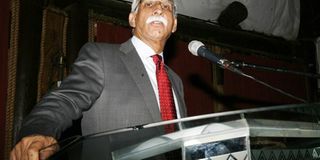Give children life skills, says varsity boss

Firoz Rasul, President of the Aga Khan University, at the launch of the Institute for Human Development at the Safari Park Hotel in Nairobi on February 12, 2015. PHOTO | EVANS HABIL |
What you need to know:
- Aga Khan University’s Institute for Human Development launched in Nairobi.
Children must be equipped early in life with skills necessary to live in a diverse world, the President of the Aga Khan University Firoz Rasul has said.
Mr Rasul noted it is important to take advantage of the early stages of a child’s development to instil ideas of pluralism and navigating one’s way in a culture that is becoming increasingly diverse.
He was speaking on Thursday during the official launch of the Aga Khan University’s Institute for Human Development in Nairobi.
“His Highness the Aga Khan, founder of the Aga Khan Development Network, has always emphasised the importance of capturing children’s minds from their earliest days of existence. This is the time to nurture and provide them with the best environment so that they have more chances in life,” he said.
The institute will focus on building human capacity and drive innovation, particularly among those in resource-poor regions of the world.
“This will in turn advance the quality of individual lives and contribute to the building of successful pluralistic societies,” said Mr Rasul.
“Aga Khan Development Network’s engagement in early childhood development began over 30 years ago with the setting up of Madrasas for children in Mombasa.”
The Foundation’s director Kofi Mario said the institute will also focus on informing policy decisions, developing innovative professional programmes and enhancing quality of services for children, families and communities.
“The success of the institute must not just be seen in the amount of knowledge generated and disseminated. It should also be evident in the breadth and magnitude of our commitment to foster and sustain partnerships across sectors and stakeholder groups within our local contexts,” he added.




